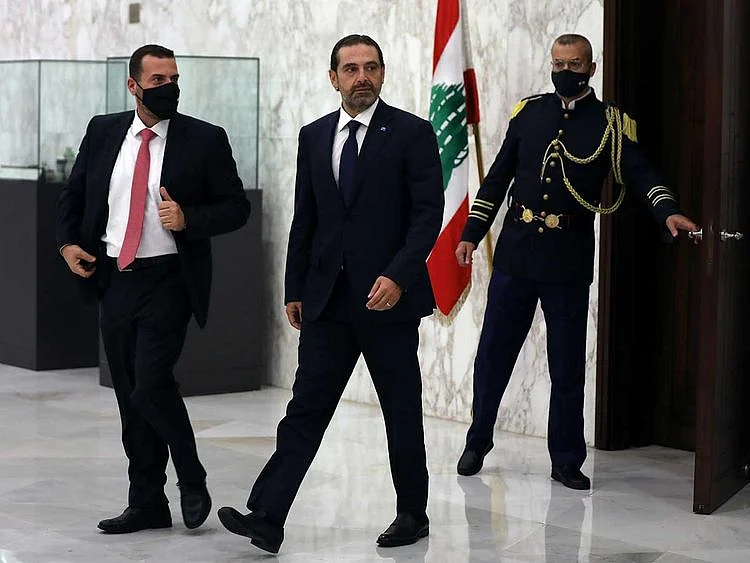Will Hariri be able to break the stalemate in Lebanon?
Urgent reforms await as government formation takes a long time in the country

The US sanctions that were announced this month against Gibran Basil, head of the Free Patriotic Movement (FPM) may have come as a blessing-in-disguise for Prime Minister-designate Saad Al Hariri, who has been struggling to form a government since mid-October. Many opine that it enables Hariri to free himself from any obligation towards Basil, who has been insisting on Cabinet Office for himself, given that he is head of the largest bloc in Parliament, with a total of 23 seats. Basil has been eager to restore some of his injured pride, after being forced out of office by the October Revolt of 2019. Back then, young Lebanese had taken out their anger against Basil, accusing him of nepotism.
His insistence on a comeback is often accompanied by reference to a 2016 agreement between Hariri and his father-in-law, President Michel Aoun, which brought the latter to the presidency in exchange for making Hariri prime minister. Members of the Hariri team argue, however, that the 2016 understanding applied to Aoun only and not to his son-in-law. Now with the US sanctions, Hariri has enough reason to apologise politely to Basil, claiming that making him minister would not be feasible.
Interior, Foreign Affairs, and Energy
But in addition to the Basil dilemma, which seems to have been solved, there are other sources of friction between Hariri and the FPM, explaining why the cabinet talks are going nowhere. Aoun is making claims to the interior ministry, which has traditionally bee held by a Sunni member of Hariri’s Future Movement. Rotation of government office and doing away with preset quotas is a main pillar of the French initiative, after all, announced by President Emmanuel Macron during his back-to-back visits to Lebanon in August and September.
Hariri is saying that he is willing to give the post to a Christian member of his own Future Movement but not to the FPM, who already control defence and foreign affairs. Hariri’s team has hinted that he would be willing to relinquish the portfolio of interior in exchange for the Ministry of Foreign Affairs, which Aoun refuses to cede.
There is also disagreement over the portfolio of energy, which is also being claimed by both Hariri and Aoun. They had originally agreed to name a compromise candidate to the post, but the president has backed out on that understanding, insisting on his exclusive rights to the Ministry of Energy, which plays an increasingly important role in light of the UN-sponsored maritime talks, aimed at diluting differences over Lebanon’s natural resources. The Ministry of Energy has been held by the Aounists since 2009.
Christian representation
Aoun is also saying that he is entitled to naming all Christian ministers, putting forth names that are either affiliated with his son-in-law or who are nominated directly by him. The Aounists are also making claim to all seats previously occupied by their Christian rivals in the Lebanese Forces (LF), being administrative development, social affairs, labour, and the deputy premiership. During Hariri’s third cabinet, the Aounists and their Christian affiliates had held ten out of thirty portfolios, while the LF controlled no more than four.
The LF has pulled all of its MPs from parliament after the Beirut port explosion of 4 August, making Hariri and Aoun under no obligation to bring them on-board the new government, since they are technically no longer a powerful bloc in Parliament. They have also parted ways with Hariri, who is a former ally and friend of their leader Samir Gagegea. The LF also accuse Hariri of breaking Lebanon’s promise to France, by applying the preset quota for political parties and sects, which runs contrary to the Macron initiative.
Hariri is very wary of bring Hezbollah-affiliated Christian figures on-board his new government, however, especially after sanctions were slapped on Gibran Basil earlier this month. What if he names a minister who is sanctioned by the Trump Administration anywhere between now and 20 January 2021? These are questions to which the prime minister-designate does not have answers, also explaining the lack of progress on cabinet formation.
To date, the only parties that have been fully accommodated by Saad Al Hariri are Hezbollah and Amal, who combined control 29 seats in Parliament. In exchange for supporting his comeback, they had put forth a series of conditions, like refusing to increase taxes or lift state subsidise, getting to name all Shiite ministers and keeping the Ministry of Finance in the hands of Amal, while giving Hezbollah the ministry of health. That is if a small cabinet is formed of 18 ministers but if it is expanded to 20-24, then each Shiite party will get to name two ministers.
Hezbollah has tried, with little luck, to obtain the portfolio of public works which will be charged with rebuilding the port of Beirut — and the entire city — when and if reconstruction begins. Hariri has apologised, saying that if they are accommodated on that request, then this might trigger an angry response from the Americans, possibly sanctioning the entire ministry. Hezbollah and Amal seem to have accepted that argument. With the country at an interesting crossroad, it remains to be seen what the next step of Hariri will be?
— Sami Moubayed is a Syrian historian and former Carnegie scholar. He is also author of Under the Black Flag: At the frontier of the New Jihad.
Sign up for the Daily Briefing
Get the latest news and updates straight to your inbox
Network Links
GN StoreDownload our app
© Al Nisr Publishing LLC 2025. All rights reserved.